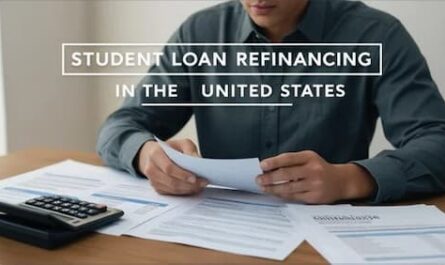You might promptly consider federal student loans when you think about paying for college and sometimes they don’t cover all your expenses. That’s where private student loans come into play, filling the gap so you can focus on your studies without constant financial stress. But with so many private lenders out there, you’ll have to know which one is right for you. It’s important to understand how private student loans work, their eligibility criteria, interest rates, and what lenders offer, so you can make an informed decision that suits your needs.
What are private student loans and how do they differ from federal loans
Private student loans are offered by banks, credit unions, and online lenders rather than the federal government. Unlike federal loans, which base eligibility mostly on financial need and have fixed interest rates set by the government, private loans depend heavily on your creditworthiness, income, and sometimes require a co-signer. This means your interest rate can vary widely depending on your or your co-signer’s credit score and financial history. Meanwhile, federal loans typically offer more borrower protections and flexible repayment options, but they might not cover all your college costs, prompting you to look into private loans to bridge that gap.
Who is eligible for private student loans
You might wonder, “Can I get a private student loan?” The answer depends on several factors. First, you usually need to be enrolled at least half-time in an eligible school program. Your credit history plays a big role here, if your credit score isn’t strong, you’ll likely need a creditworthy co-signer, often a parent or guardian. Both the borrower and the co-signer must be U.S. citizens or permanent residents according to most lenders. Some lenders allow international students with a U.S. based co-signer.
Age requirements vary by state but generally, you must be at least 18 years old. The FAFSA is not needed for private loans, in contrast to federal loans, which can make the application process easier. However, you will need to provide personal financial information like income, employment history, and sometimes tax returns, to prove your ability to repay the loan.
How private student loan interest rates and repayment work
Private student loans interest rates can be permanent or changeable. Fixed rates stay the same throughout the life of the loan, while variable rates can fluctuate based on market conditions. The average interest rate on private student loans is currently 7.4% for 10-year fixed loans and 7.7% for 5-year variable loans, though these might vary based on your credit and the lender’s terms. Compare this to federal student loan rates, which range from about 6.5% to 9%, depending on the loan type and borrower status.
You should know that private loans often come with fewer borrower protections than federal loans. For example, federal loans offer income-driven repayment plans and deferment options that private loans may not. On the other hand, private lenders sometimes offer perks like automatic payment discounts or flexible repayment schedules, but these vary widely.
What are the top private student loan lenders in the U.S.
If you’re considering private student loans, you might be curious about which lenders are known for their favorable terms and service. College Ave is often recognized as the best overall private student loan lender. They allow you to borrow up to 100% of your education costs, don’t require a co-signer, and charge no origination fees. Their repayment options are flexible, and they offer a six-month grace period after graduation before you start paying back the loan. However, compared to some competitors, funding can take up to 10 working days.
If you need fast approval, Citizens Bank is a good option. They can approve loans almost immediately in certain cases, with loan amounts up to $150,000 and competitive fixed and variable APRs. This lender also offers refinancing options and loans for medical residents, which is helpful if you’re pursuing advanced degrees.
Other lenders worth mentioning include Ascent, which caters to borrowers without co-signers, RISLA with competitive APRs, PNC Bank offering automated payment discounts, and SoFi, which provides member benefits like career coaching and financial planning.
What to acknowledge before applying for a private student loan
Before you apply, you should gather all necessary documents like your social security number, proof of income, employment details, and possibly tax returns. This preparation can help speed up the application process and reduce stress. Also, compare offers from multiple lenders, interest rates and terms can vary significantly based on your credit profile and loan amount.
Remember, private student loans generally have higher interest rates than federal loans unless you have excellent credit or a strong co-signer. So, it’s important to exhaust federal loan options first. If you still need additional funds, private loans can be a helpful resource, carefully review the terms and understand the repayment obligations to avoid surprises later.
How does private student loan debt impact you
Student loan debt is the next biggest category of client debt after mortgages. The average federal student loan balance is around $38,375, while total average debt including private loans can be over $41,000. This means that private loans contribute a meaningful portion of your overall student debt, affecting your financial future. Therefore, getting the best possible interest rate and favorable repayment terms can save you thousands of dollars over time.
Choosing the best private student loan
You might feel overwhelmed by all the options and fine print, but taking the time to understand your eligibility, compare interest rates, and consider lender features can make a big difference. Private student loans can provide the extra funding you need to complete your education, but they come with responsibilities. By choosing lenders like college Ave or citizens bank, you can find options that offer flexibility, competitive rates, and features that align with your financial situation.
And while private loans can be a valuable tool, always weigh them against federal loans and scholarships first. Meanwhile, keep track of your credit and explore having a co-signer if necessary, as this can help you secure better loan terms. Thereby, you can manage your education financing wisely, setting yourself up for a smoother financial journey after graduation.
For more information on student loan refinancing in the U.S, check out this post on: Best student loan refinancing in U.S.



